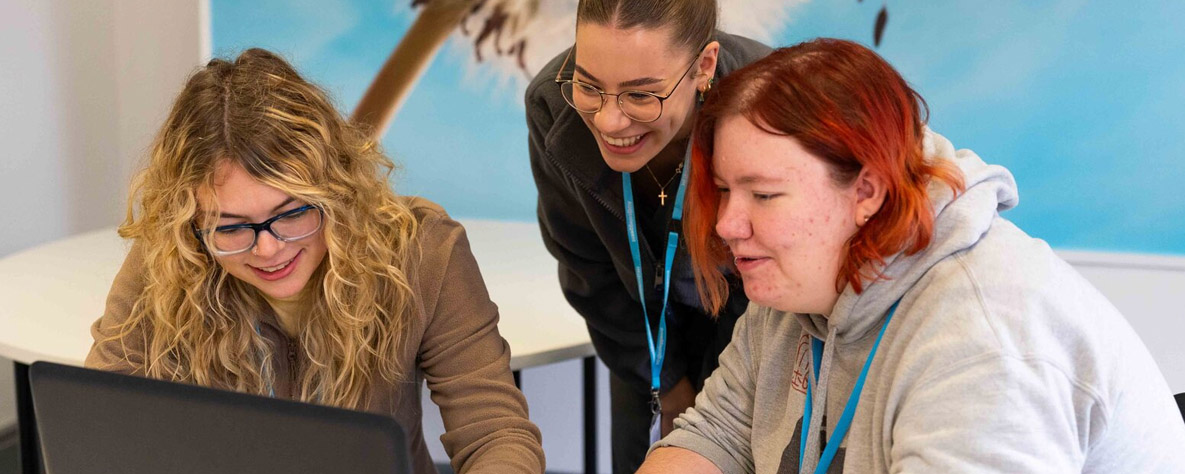
What's Next? Advice for Post-16 Learners
8 May 2025
Frequently Asked Questions for School Leavers
Leaving school and figuring out what to do next can be pretty overwhelming. With so many options out there, it’s important to make sure you’re fully informed so you can make the best choice for your future.
We’re here to answer some of the most common questions you might have about your next steps, from picking the right subjects to understanding how to apply and what support you can get. This handy guide will help you figure out what’s best for you.
What’s the difference between A Levels and BTECs?
A Levels and BTECs are both popular choices after GCSEs, suited to different learning styles and career goals. Here are the key differences:
A Levels
- A Levels are generally more academic, covering subjects like maths, sciences, humanities, and languages.
- Usually, you take exams at the end of the two-year course.
- Traditionally seen as the standard route for learners wanting to go to university.
- Mix and match between 2-3 A Level subjects.
BTECs
- BTECs are all about learning by doing in subjects like business, health and social care, science and sport.
- You’ll do coursework, projects, and sometimes exams.
- Get the skills and knowledge needed for a specific career.
- BTECs are available at different levels, including Level 3, which is the same as A Levels.
- Both qualifications can help you get into university or a job, depending on your career goals and how you like to learn. Take a look at our ‘What’s Next’ guide for more information on your options after leaving school.
Do I need to choose a GCSE in the same subject I’m hoping to study at college?
No, not necessarily! You’re far more likely to do well if you choose subjects you enjoy. Here are some helpful tips when choosing your GSCEs:
- Choose subjects you enjoy and are passionate about. This will make studying more enjoyable and less stressful.
- If you have a specific career in mind, research what subjects might be needed for that field.
- Think about the subjects that will be useful for A Levels, BTECs, or other post-16 qualifications.
- Choose a mix of subjects to keep your options open.
- Discuss your options with your family, teachers and career advisors. They can offer support and help you think through your choices.
- Look into what each subject involves. Understanding the coursework and exam requirements can help you make an informed decision.
Remember, it’s okay to feel uncertain. Take your time to explore your options and choose subjects that align with your interests and future aspirations.
We recommend applying sooner rather than later, as many of our places fill up fast. Applications are processed on a first come, first served basis, so applying early gives you the best possible chance of getting a place.
What happens if I fail English and Maths?
As a full time learner at the College, you’ll get support to improve your maths and English. If you didn’t get a grade C or above in GCSE maths and English, you’ll continue studying these subjects with us. Depending on your level, this will either be re-taking your GCSEs or working on Essential Skills. If you already have a grade C or above, you’ll keep developing these skills through your main course or the Skills Challenge Certificate.
Most employers and universities look for applicants with GSCE maths and English Grades A* to C. If you don’t have these qualifications, it can limit your job and study options. But don’t worry, if you didn’t get the grades you need, we can give you a second chance.
Why Improve your Maths and English?
- Boost your job prospects
- Expand career opportunities
- Potentially earn more money
Will I receive any financial support?
There are many ways you can get help with the cost of studying, with lots of different grants available depending on your circumstances. If you’re 16 to 18 years old and living in Wales, you could be entitled to EMA, which could give you £40 a week, paid every two weeks.
For help or advice, contact Learner Services at one of our campuses or call 01495 333777. Head to our financial support page to find out everything you need to know about applying for financial support.
Do I need to pay for my courses?
If you’re thinking about studying A Levels or BTECs at �鶹��ý�Ŷ�, here’s some good news: you don’t have to pay for them! This means you can focus on choosing the subjects you love and planning your future without worrying about tuition fees.
Deciding what to do after school is a big deal and can really impact your future. By learning about the differences between A Levels and BTECs, understanding why English and maths are so important, and knowing how to apply, you can make smart choices that suit your goals. It’s totally normal to feel unsure, so don’t hesitate to ask your teachers, career advisors, or our friendly student recruitment team here at the college. With the right info and support, you can confidently start your next chapter and set yourself up for success.